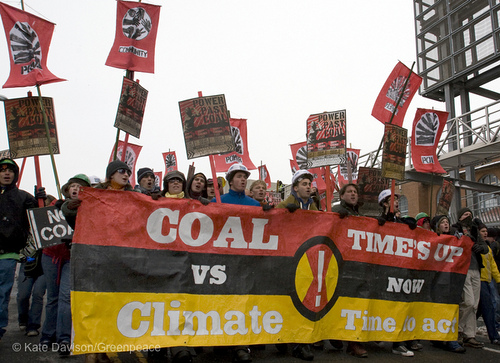Joshua Kahn Russell, the grassroots actions manager at Rainforest Action Network and a lead organizer of March’s Capitol Climate Action in Washington, DC, has written a great assessment of the climate justice movement and its emerging goals.
Looking back at the historic protest at the Capitol Power Plant, which ultimately forced congressional leaders to come clean on the use of dirty coal, Josh notes:
We organized the Capitol Climate Action because we saw an opening to connect these struggles more publicly, help build momentum around them, and “supercharge” the energy to keep the exponential increase rising.
This struggle has transcended single-issue organizing. The varied efforts to stop coal have brought diverse stakeholders together. Stemming from the people of color, working class, and women-led Environmental Justice movement, Climate Justice has become a political banner for the climate crisis’ intersecting racial justice, economic equity, community health, and environmental quality issues, of which elements of “no coal struggles” are a part. It is useful to think of campaigns against coal as one strand of a robust frontline-led Climate Justice movement.
Josh examines the Capitol Action’s three main goals and outcomes — change the national conversation on climate, press the new administration and Congress for bolder climate policy in 2009, and build the climate justice movement and legitimize non-violent direct action and civil disobedience — and then discusses the role of direct action in the growing anti-coal movement. He writes:
The seeds are planted for decentralized actions against coal across the United States, integrated with varied campaigning tactics on multiple fronts. Should we be successful at networking efforts, this network must weave itself into a broader Climate Justice movement (whether or not it uses that name). If we hope to win, the movement must be relevant enough to relate to, and help create, a broad-based progressive majority that is unafraid to build unlikely alliances across the political spectrum, while maintaining a principled anchor of its left wing.
Groups helping anchor the left wing of this formation are tying conditions to participation. These conditions currently center around economic empowerment and social uplift for communities of color and other impacted peoples, led by a compelling, if potentially co-opt-able, call for green jobs. Climate Justice organizers can build their leverage in this new political terrain through increased demonstrations of power. The Capitol Climate Action sought to test our limits, and found that we’re ready for more. So let’s push further.
Indeed, let’s push further.
Read the complete article on Josh’s blog or a shorter version in Z Magazine.



